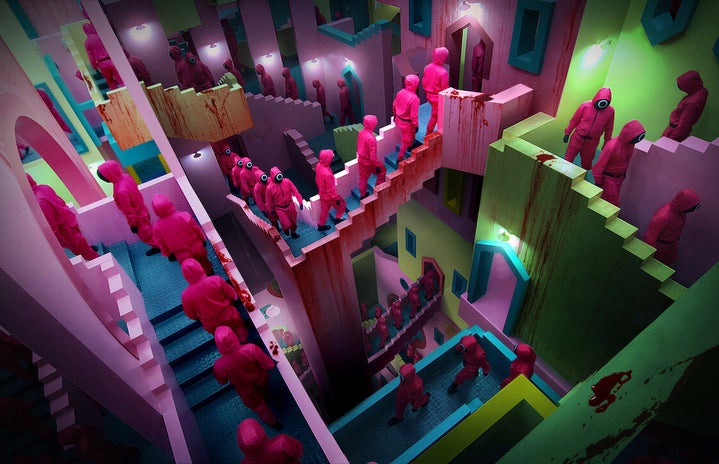*Warning: This article contains spoilers about Netflix’s Squid Game.*
If you watched Squid Game on Netflix, you likely finished all nine episodes in just a few days. (It’s okay, me too.) Its plot twists and cliffhangers made it impossible to stop watching. If you didn’t watch this new series, I’ll briefly summarize it.
Set in South Korea, the show follows Seon Gi-Hung, a divorced chauffeur who lives with his sick mother. His gambling addiction leaves him in a cycle of extreme financial debt and instability. When approached by a stranger for a chance to win money, he can’t help but take up the offer but ends up on a deserted island with 455 other individuals, surrounded by masked staff members who explain rules regarding gameplay and elimination. During the first game, it is revealed that elimination = death. Each person who fails to play the game correctly is brutally shot and murdered with a rifle.
After the first game, the staff explains how the prize money works: each individual who dies racks up more cash in the “piggy bank.” They estimate the end reward to be 45.6 billion won, which is equivalent to $38,500,000. Despite this major announcement, the majority of players still vote to go home. Once they return back to their normal lives, however, many of them realize just how miserable they are. They are offered a second chance to return to the island and continue gameplay. Almost all of them go back with one thing in mind: win the game, earn the money, and finally live a happy life.
Five games follow, each one seemingly more brutal and unforgiving than the last. Seon Gi-Hung is one of the final two players, and when he refuses to kill his opponent, the man kills himself. Gi-Hung goes home with the prize money but ends up even more depressed than when he started.
This show clearly displays the costs of capitalism and the lengths individuals will go to stay afloat. Towards the end of the series, a group of wealthy men is shown watching the games and betting on players. It is slowly revealed that the games were created solely for entertainment purposes. The power that the rich hold only negatively affects those below them, and in turn, those at the bottom see each other as enemies in competition. While the gamblers found joy in watching everyone murder each other, players were killing each other in order to obtain the prize money. It is easy to pinpoint the players as greedy, but in reality, they were acting out of a need for survival. Their lower-class position in society pushed them to the edge and made them do extreme things for the possibility of a better life.
The most interesting aspect of Squid Game is that while the entire show is Korean, the rich gamblers are English-speaking Americans. In my opinion, this is a commentary on how the rest of the world perceives the U.S. We are the face of greed and capitalism: big corporations thrive while those at the bottom rot. The flashiest cities with unfathomably expensive cars and massive mansions are also home to alarmingly high homeless populations. The “American dream” consists of getting more money, more power, and more fame. People will do anything to obtain this “dream” because they truly believe it will provide them with happiness. This is what capitalism has drilled into our brains.

One year after the games finish, Gi-Hun is in a much worse state than before, and the balance of 45.6 billion won on his card remains the same. After watching everyone around him die in inhumane ways, he finds no purpose in life. He is full of guilt, emptiness, and most of all, anger towards the creators of the game. The life he imagined living after obtaining the prize money was nothing close to reality. That’s the cherry on top of the whole message: money can’t buy happiness, especially when it comes at the expense of others.
Can’t get enough of HC UMass Amherst? Be sure to follow us on Instagram, listen to us on Spotify, like us on Facebook, and read our latest Tweets!



